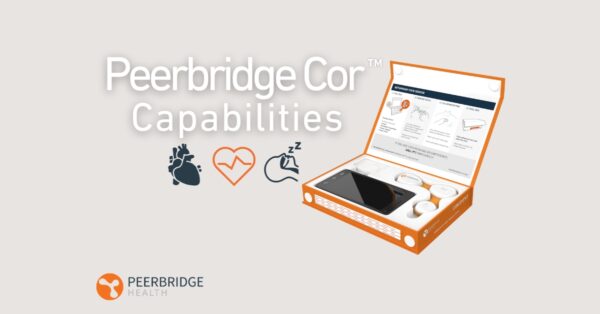Peerbridge Health announced today the start of patient enrollment for a prospective, feasibility, multi-center clinical trial to provide AI-enabled ejection fraction (EF) on-demand using the Peerbridge CorXTTM, a patented 3-lead, 2-channel wireless ambulatory ECG (AECG) wearable device. The ability to remotely provide EF does not currently exist in the AECG Holter market. A successful trial is an enabling step forward in remote monitoring of heart health.
More than 92 million Americans suffer from some form of cardiovascular disease (CVD) each year. EF, which measures the effectiveness of the heart’s ability to pump blood, is a vital diagnostic measure for CVD patients. A low EF measurement may indicate heart failure or other serious cardiac conditions. Currently, the standard of care for measuring EF is echocardiography (echo), which is performed in a clinic or hospital setting.
“Serious cardiovascular diseases affect millions and are often difficult to detect until symptoms worsen, resulting in life-threatening events,” said Andrea Natale, MD, Executive Medical Director of Texas Cardiac Arrhythmia Institute at St. David’s Medical Center. “The Peerbridge Cor’s AI-enabled ECG technology has the potential to transform how heart failure is diagnosed and treated. With the ability to remotely capture and continuously monitor a patient’s EF, clinicians can improve medication management and reduce overall treatment times.”
This study will establish Cor’s ability to compute direct-from-ECG EF and its equivalence to EF measurements derived from an echo. This functionality would allow physicians real-time, over-the-air access to this important heart function measurement – at any time and from anywhere, allowing faster diagnosis and treatment for patients. Currently, Lenox Hill Hospital, Northwell Health (NY) and Orange County Heart Institute (CA) are among the enrolling sites.
“We are excited to begin this important clinical study to evaluate predictive EF from ECG,” said Nicholas Skipitaris, MD, MBA, Western Regional Director, Cardiac Electrophysiology at Northwell Health. “A successful trial will have tremendous clinical applications across cardiology and electrophysiology, providing immediate and continuous access to an extremely critical heart health metric. This technology could alert physicians to any changes in real-time and allow for early intervention, potentially reducing hospitalizations and improving patient outcomes.”
Additional benefits of on-demand detection of EF for physicians include more informed treatment decisions, real-time tracking of the effectiveness of interventions, lower healthcare costs, and better patient education. For patients with low EF, understanding their diagnosis can provide valuable insights into their underlying condition and contribute to important lifestyle changes and medication adherence.
“Patients benefit greatly when EF is detected earlier,” Brian Kolski, MD, Director of Structural Heart Disease at Saint Joseph Hospital in Orange County. “On-demand EF by the Peerbridge Cor means patients will receive more prompt, proactive medical care. Common barriers like transportation and travel time, which weigh heavily on patients, will be drastically reduced by this technology. The end result: improved quality of life for our patients which is our ultimate goal.”
“This study is a pivotal step forward in our goal to transform remote healthcare through our AI-driven advanced diagnostic platform,” said Chris Darland, CEO of Peerbridge Health. “Positive results will have far-reaching impacts as we push the boundaries of what is currently possible with AI-enabled ECG. Giving physicians the ability to address acute and chronic health issues quickly and cost effectively while reducing burdens for patients is a key element to democratizing healthcare and serving patients exactly where they are.”
Final data for this trial is expected to be completed in June 2023.




